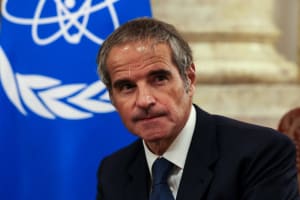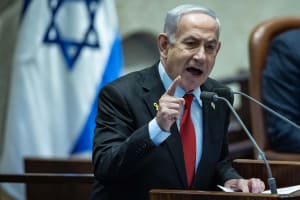IAEA and Iran sign agreement on nuclear issues intended to prevent E3 snapback sanctions
Representatives of E3 tell IAEA Board of Governors the agreement is insufficient without inspections

On Tuesday, Iran and the International Atomic Energy Agency announced a new agreement to renew cooperation on several matters, a move seen as Tehran’s attempt to head off potential snapback sanctions from the E3, the three major European powers involved in diplomacy with Iran: the United Kingdom, France, and Germany.
The agreement was signed in Cairo, Egypt, following meetings between Iranian Foreign Minister Abbas Araghchi, IAEA Director Rafael Grossi and Egyptian Foreign Minister Badr Abdelatty. Grossi had previously warned that Iran was running out of time.
Few details of the agreement were disclosed at the announcement, and doubts remain about its scope, given that Iran’s parliament passed a law in July suspending all cooperation with the UN nuclear watchdog. Although the measure was signed by President Masoud Pezeshkian, ultimate authority rests with Supreme Leader Ayatollah Ali Khamenei.
Iran ceased all cooperation with the International Atomic Energy Agency following the June 13 strikes by Israel and the resulting 12-day war. This latest agreement represents the first step towards resuming cooperation with the UN agency, and the Islamic Republic’s responsibilities under the nuclear Nonproliferation Treaty (NPT).
After the signing, Grossi described the agreement as “a step in the right direction.”
The status of inspections, however, was left unclear — particularly in light of Israeli and U.S. strikes on the nuclear sites at Isfahan, Fordow, and Natanz. The only site that IAEA inspectors have visited since the end of the Israel-Iran War is the Bushehr Nuclear Power Plant, which operates with Russian cooperation.
Conflicting statements from Grossi and Araghchi regarding the status of inspections under the agreement have raised doubts about its effectiveness in preventing the UK, France, and Germany (E3) from triggering snapback sanctions.
In an address to the IAEA Board of Governors, Grossi presented the agreement as having restored "complete" access for IAEA inspectors to Iran’s nuclear facilities. He said the "technical document” of the agreement provides "practical modalities to resume inspection activities in Iran.”
Speaking to the Board of Governors, Grossi said, "These include all facilities and installations in Iran and also contemplate the required reporting on all the attacked facilities, including the nuclear material present at those.”
Shortly afterwards, Araghchi countered Grossi’s claims, telling Iranian state TV, “I have to reiterate the agreement does not currently provide access to IAEA inspectors, apart from the Bushehr nuclear plant.”
A statement from the E3 representatives to the IAEA Board suggested that it is not convinced by Iran’s agreement.
“On 2 July 2025, an Iranian law suspending IAEA inspector access was brought into force,” the E3 statement read. “The Director General’s report observes that since 13 June 2025, the Agency has had no access to any of the safeguarded nuclear facilities in Iran, except for Bushehr Nuclear Power Plant, nor has it received any of the legally required reports from Iran on its nuclear programme. We sincerely hope this is about to change.”
The E3 statement warned that “the IAEA has now also lost continuity of knowledge regarding Iran’s current inventories of nuclear material, including High Enriched Uranium,” adding, “This should be of utmost concern to all states.”
The E3 nations said that “for several months Iran demanded ‘separate’ and ‘new’ arrangements with the IAEA with conditions outside the IAEA’s verification mandate,” instead of renewing access to inspectors as it is obligated to do.
The E3 cautioned that it must “take our previous experience into account,” warning that if the Board does not see the full and complete resumption of Iran’s Safeguards Agreement by its next meeting, “we must be prepared to hold Iran to account and submit the report required under the IAEA Statute and the June resolution that found Iran non-compliant with its Comprehensive Safeguards Agreement.”
Such a decision would trigger the snapback sanctions, which the E3 threatened to impose by the end of September without Iranian compliance.
“Iran’s full cooperation with the IAEA, and full implementation of its legal safeguards obligations, is a necessary foundation if we are to achieve an enduring agreement to address concerns around Iran’s nuclear activities,” the E3 stated.

The All Israel News Staff is a team of journalists in Israel.
You might also like to read this:

















